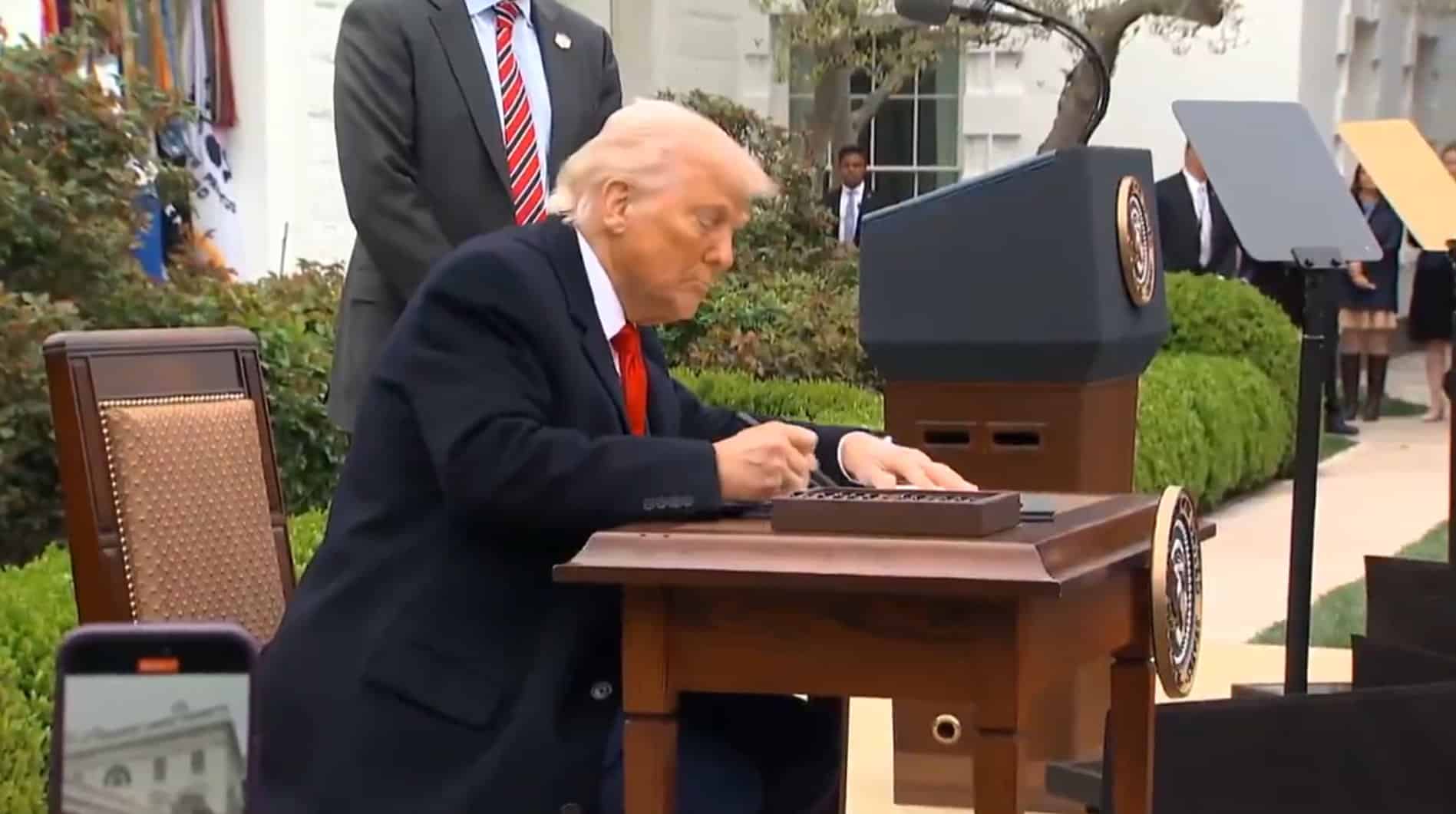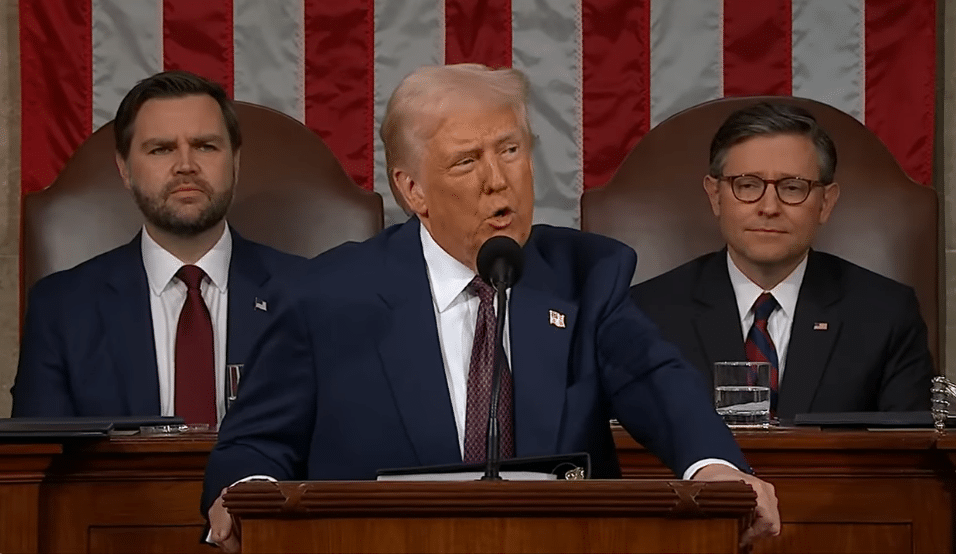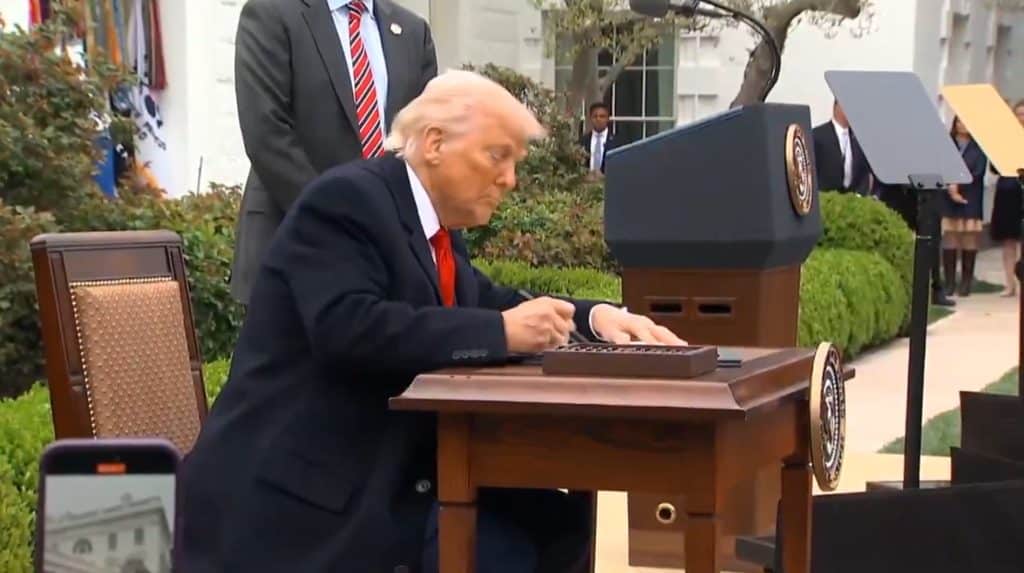
May 29, 2025
Permission to republish original opeds and cartoons granted.
The Judicial Tyranny Undercuts The President’s Ability To Conduct Foreign Affairs As Court For International Trade Strikes Down Tariffs
| 
|
|
The U.S. Court for International Trade on May 28 struck down President Donald Trump’s national trade emergency, the reciprocal tariffs he put into effect on April 2 and other tariffs in 2025 including those seeking foreign assist to repel the fentanyl trade, throwing the subsequent tariff negotiations with the United Kingdom, China, India, Japan, South Korea and so forth into chaos. The tariffs were instituted under the National Emergencies Act and the International Emergency Economic Powers Act. Under 50 U.S. Code Sec. 1701: “Any authority granted to the President by section 1702 of this title may be exercised to deal with any unusual and extraordinary threat, which has its source in whole or substantial part outside the United States, to the national security, foreign policy, or economy of the United States, if the President declares a national emergency with respect to such threat.” All that is necessary under the IEEPA is that the President declare there to be an “unusual and extraordinary threat” in his emergency declaration, whether it is Russia’s invasion of Ukraine, making a case for sanctions to put pressure on Moscow to end the war, or the $1.2 trillion trade deficit in 2024, making a case for reciprocal tariffs to facilitate trade negotiations. Once again, this is a political question with which the President has discretion — but also one wherein federal courts are determining themselves to be the sole arbiter of. Was President Trump elected to make these decisions, or federal judges? What system of government do we have exactly? |
Saul Anuzis: The Big Beautiful Bill: A Lifeline for America’s Seniors
| 
|
|
In an era when many older Americans struggle to meet their most basic needs, the Big Beautiful Bill stands out as a transformative piece of legislation—a rare example of common-sense policy that prioritizes dignity, stability, and security for our senior citizens. Across the country, seniors face mounting challenges. Fixed incomes barely stretch far enough to cover skyrocketing housing and medical costs. Prescription drugs often remain unaffordable, and navigating government services can be overwhelming. For too long, older Americans—who have contributed decades of labor, wisdom, and community service—have been marginalized in policy conversations. The Big Beautiful Bill changes that. At its core, the bill provides robust financial and healthcare support to seniors. It increases Social Security benefits by reducing taxes on them, helping better reflect the real expenses seniors face—such as rising medical costs and housing expenses. This simple yet powerful change ensures that monthly checks align more closely with the financial realities of aging. Instead of falling behind inflation, seniors’ incomes will finally keep pace with their needs. The bill also delivers permanent tax cuts and bigger paychecks—an extra $5,000 in the pockets of working Americans—through a double-digit percentage decrease in tax bills. Americans earning between $30,000 and $80,000 will see an average tax reduction of about 15%. The Big Beautiful Bill is not just beautiful in name—it’s beautiful in purpose and impact. It delivers tangible relief to those who have given so much to this country. By passing this legislation, we affirm that in America, no one is too old to matter. |
Urge President Trump & Secretary Of State Rubio To Uproot The Deep State!
| 
|
|
On January 20, President Trump signed an executive order to revoke the clearances of 51 national security officials who, in October 2020, signed the Hunter Biden laptop letter that falsely suggested that the news story was part of a Russian disinformation campaign. Elections have consequences. With power comes action and also results. The president has started to remove people who are part of the deep state, which has prevented and blocked the administration from continuing to execute the people’s agenda, which he was elected to do. However, no action has been taken against several national security officials who, in September 2019, signed a national security action letter calling for impeachment proceedings against President Trump. Some of the letter’s signatories are still entrenched in government or work for government contractors. These individuals are akin to sleeper cells, representing the deep state, which will continue to hamper efforts to create an administration more fully in sync with the president’s “America First” agenda. To ensure that the president is able to implement his “America First” agenda free of interference, the administration would be wise to revoke the security clearances of anyone remotely associated with efforts to undermine President Trump during his first term. |
The Judicial Tyranny Undercuts The President’s Ability To Conduct Foreign Affairs As Court For International Trade Strikes Down Tariffs

By Robert Romano
The U.S. Court for International Trade on May 28 struck down President Donald Trump’s national trade emergency, the reciprocal tariffs he put into effect on April 2 and other tariffs in 2025 including those seeking foreign assist to repel the fentanyl trade, throwing the subsequent tariff negotiations with the United Kingdom, China, India, Japan, South Korea and so forth into chaos.
The tariffs were instituted under the National Emergencies Act and the International Emergency Economic Powers Act. There need not be a war. That’s clear from the scheme of laws Congress enacted.
Originally the 1917 Trading With the Enemy Act, the law initially provided “That it shall be unlawful… [f]or any person in the United States, except with the license of the President, granted to such person, or to the enemy, or ally of enemy, as provided in this Act, to trade, or attempt to trade, either directly or indirectly… or is conducting or taking part in such trade, directly or indirectly, for, or on account of, or on behalf of, or for the benefit of, an enemy or ally of enemy.”
An enemy was defined as “any nation with which the United States is at war, or resident outside the United States and doing business within such territory, and any corporation incorporated within such territory”.
This was later expanded in 1933 by the Emergency Banking Act to include national emergencies: “During time of war or during any other period of national emergency declared by the President, the President may, through any agency that he may designate, or otherwise, investigate, regulate, or prohibit, under such rules and regulations as he may prescribe, by means of licenses or otherwise, any transactions in foreign exchange, transfers of credit between or payments by banking institutions as defined by the President…”
Over the years, these authorities have been used to place a variety of trade sanctions including embargos on North Korea, Vietnam, Cambodia, Cuba, Russia, Iran, Venezuela and other adversary countries.
The Court for International trade in 1975’s Yoshida v. United States decision had even upheld Richard Nixon’s national emergency declaration in 1971 to impose 10 percent tariffs across the board to address the trade deficit. The court found back then: “We conclude, therefore, that Congress, in enacting § 5(b) of the TWEA, authorized the President, during an emergency, to exercise the delegated substantive power, i.e., to ‘regulate importation,’ by imposing an import duty surcharge…”
Since that time, Congress enacted the 1977 International Emergency Economic Powers Act, which modified the Trading With the Enemy Act to remove the national emergency component but then reincorporate the national emergencies to 50 U.S. Code Sec. 1701: “Any authority granted to the President by section 1702 of this title may be exercised to deal with any unusual and extraordinary threat, which has its source in whole or substantial part outside the United States, to the national security, foreign policy, or economy of the United States, if the President declares a national emergency with respect to such threat.”
And the law included a very similar set of authorities under 50 U.S. Code Sec. 1702: “the President may, under such regulations as he may prescribe, by means of instructions, licenses, or otherwise… investigate, regulate, or prohibit… any transactions in foreign exchange, … transfers of credit or payments between, by, through, or to any banking institution, to the extent that such transfers or payments involve any interest of any foreign country or a national thereof, … the importing or exporting of currency or securities, by any person, or with respect to any property, subject to the jurisdiction of the United States…”
That is exactly how trade is conducted, by “importing or exporting currency… with respect to… property…” That is even broader than if the law had stated, as the Trading with the Enemy Act did, “to trade, or attempt to trade…” It covers more transactions than just those that take place international trade, and could just be moving money or securities around.
The law as written allows for broad economic trade embargoes to be instituted by a President. Meaning more than just tariffs, the President could just institute sanctions and completely block trade from a country. We were in the middle of a trade discussion with China. Is President Trump’s only option now to just put a trade embargo on China, cite their human rights abuses and ongoing threats against Taiwan, and call it a day?
But now the same court finds that the 1971 Nixon tariffs were “limited”. How so? Nixon put a 10 percent tariff on the entire world because of the rapidly expanding trade deficit that he said was a national emergency.
In 2024, the trade deficit hit a record $1.2 trillion, which once again, this time President Trump declared a national emergency and imposed reciprocal tariffs on the entire world to facilitate new trade negotiations. It’s the same thing.
All that is necessary under the IEEPA is that the President declare there to be an “unusual and extraordinary threat” in his emergency declaration, whether it is Russia’s invasion of Ukraine, making a case for sanctions to put pressure on Moscow to end the war, or the $1.2 trillion trade deficit in 2024, making a case for reciprocal tariffs to facilitate trade negotiations.
Once again, this is a political question with which the President has discretion — but also one wherein federal courts are determining themselves to be the sole arbiter of. Was President Trump elected to make these decisions, or federal judges? What system of government do we have exactly?
That the Court for International Trade was answering a political question is beyond doubt, for example, it complains that President Trump’s tariffs designed to compel Mexico, Canada and China to help assist the U.S. in repelling the fentanyl trade won’t work: “The Trafficking Tariffs fail because they do not deal with the threats set forth in those orders.”
Who the heck do these judges think they are? They are simply supposed to “say what the law is,” not whether they think the tariffs will “deal with the threats” articulated in the President’s emergency declaration. The President decides what’s an emergency and what is not. That should be the beginning and the end of the inquiry.
The sanctions on Russia have not done much to end the war in Ukraine either, but have been in place since 2014 and expanded again in 2022 all the same. Venezuela and Cuba are still socialist hellholes but the President has the power to put sanctions on Venezuela’s oil sector or Cuba’s exports, respectively, all the same. They don’t have to be effective or “deal with the threats” in the court’s eyes, because the court’s opinion on those topics is irrelevant!
This cuts to the heart of the President’s capacity, in the scheme of laws enacted by Congress and also under the President’s unquestioned Article II powers to conduct foreign affairs, to use sanctions and tariffs as means of putting pressure on foreign countries to make changes to their policies in U.S. interests, in this case, by lowering tariff and non-tariff trade barriers that are hindering the ability of U.S. companies to export their products overseas.
For what the court has done here is undercut the duly elected President’s ability to enact his trade agenda he has campaigned for more than 10 years on, disenfranchising the 77 million Americans who voted for Trump.
Also very bad, this has a high probability to signal to trade partners that it is now open season on the United States as it relates to tariff and non-tariff barriers, since this cripples the President’s ability to quickly respond to changes overseas that effectively embargo U.S. goods. The court’s decision basically threatens national security. Nice job! (That’s sarcastic.)
The reason Congress has broadly granted powers to the President in areas related to international trade was precisely to provide a credible threat of economic force — when the President deems it necessary, so that the U.S. is a force to be reckoned with in the global economy and so we cannot be pushed around. Now it’s mandatory under the court’s ruling that we allow ourselves to be pushed around.
In 2016 and 2024, Trump ran for president and said getting tough on trade was necessary — and the American people agreed. This is what they voted for, and now the courts are saying the same powers that applied to every other president don’t apply to the current president, single-handedly dismantling the separation of powers. What could go wrong?
Robert Romano is the Executive Director of Americans for Limited Government Foundation.
To view online: https://dailytorch.com/2025/05/the-judicial-tyranny-undercuts-the-presidents-ability-to-conduct-foreign-affairs-as-court-for-international-trade-strikes-down-tariffs/
Saul Anuzis: The Big Beautiful Bill: A Lifeline for America’s Seniors

By Saul Anuzis
In an era when many older Americans struggle to meet their most basic needs, the Big Beautiful Bill stands out as a transformative piece of legislation—a rare example of common-sense policy that prioritizes dignity, stability, and security for our senior citizens.
Across the country, seniors face mounting challenges. Fixed incomes barely stretch far enough to cover skyrocketing housing and medical costs. Prescription drugs often remain unaffordable, and navigating government services can be overwhelming. For too long, older Americans—who have contributed decades of labor, wisdom, and community service—have been marginalized in policy conversations. The Big Beautiful Bill changes that.
At its core, the bill provides robust financial and healthcare support to seniors. It increases Social Security benefits by reducing taxes on them, helping better reflect the real expenses seniors face—such as rising medical costs and housing expenses. This simple yet powerful change ensures that monthly checks align more closely with the financial realities of aging. Instead of falling behind inflation, seniors’ incomes will finally keep pace with their needs.
The bill also delivers permanent tax cuts and bigger paychecks—an extra $5,000 in the pockets of working Americans—through a double-digit percentage decrease in tax bills. Americans earning between $30,000 and $80,000 will see an average tax reduction of about 15%. In addition, the bill eliminates taxes on tips and overtime work, fulfilling two of President Trump’s cornerstone campaign promises and benefiting hardworking Americans where they need it most—their paychecks.
Importantly, the bill protects Medicaid by removing 1.4 million illegal immigrants from the system, ensuring that resources are directed toward those legally entitled to receive them. It also increases expensing thresholds for businesses, which will reduce costs and expand opportunities—especially for those serving seniors or for seniors choosing entrepreneurship over full retirement.
These changes mean that seniors—and the families who support them—can rely on more substantial resources to meet their needs. It sends a clear message: this administration is committed to protecting resources older Americans depend on.
The Big Beautiful Bill honors the social contract we make with every generation—that after a lifetime of work, people deserve comfort, health, and respect. The long-term savings from reduced hospital visits, lower emergency care needs, and delayed nursing home admissions will easily offset any upfront costs.
Most importantly, the bill reaffirms a fundamental American principle: aging should not mean becoming invisible or disposable. Rather than treating seniors as burdens, this legislation recognizes their value—as grandparents, mentors, volunteers, and voters. Their lives enrich our society, and our policies should reflect that truth.
In short, the Big Beautiful Bill is not just beautiful in name—it’s beautiful in purpose and impact. It delivers tangible relief to those who have given so much to this country. By passing this legislation, we affirm that in America, no one is too old to matter.
Saul Anuzis is President of the 60 Plus Association a senior citizens advocacy group, and a former member of the Republican National Committee.
To view online: https://dailytorch.com/2025/05/the-big-beautiful-bill-a-lifeline-for-americas-seniors/
Urge President Trump & Secretary Of State Rubio To Uproot The Deep State!

To view online: https://www.votervoice.net/AFLG/Campaigns/127254/Respond
